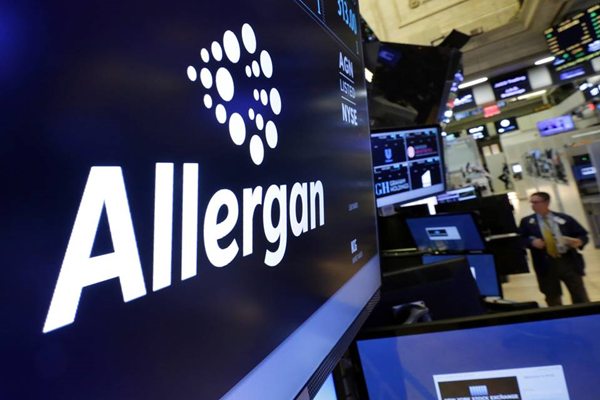|
THE
WALL STREET JOURNAL.
Business
|
Earnings
Allergan Realigns Executive Team, Outlines $10 Billion Stock
Buyback
Revenue for first quarter falls shy of expectations, though
adjusted profit edges above
|

Allergan reported quarterly earnings
Tuesday. PHOTO: ASSOCIATED PRESS |
By
Nathan Becker
Updated May 10, 2016 9:24 a.m. ET
Allergan PLC announced
plans Tuesday to streamline its executive team under Chief Executive
Brent Saunders and buy back up to $10 billion in stock as the
drugmaker reported sales that fell short of analysts’ expectations.
Wall Street should read
the share repurchases as a signal that Allergan won’t pursue the kinds
of big deals, such as the $70.5 billion transaction with Actavis PLC
in March 2015, that the company had become known for lately.
“When we look at the
universe of things to buy, we don’t see anything that is a better
investment than our own equity,” Mr. Saunders said in an interview.
Allergan will instead
focus, he said, on managing its current portfolio of products,
realizing the potential of its pipeline of promising drugs and small,
so-called tuck-in deals to supplement its current areas of focus.
For the first quarter,
Allergan said revenue rose 48% to $3.8 billion compared with the same
period a year earlier, during which the Actavis deal closed. Sales
were driven by flagship products such as anti-wrinkle treatment Botox
and growth of some newer drugs like irritable-bowel therapy Linzess.
Analysts had expected
revenue of $3.95 billion.
Mr. Saunders attributed
the miss to one-time events, such as its drug distribution unit’s
expected loss of Target Corp.’s pharmacy business. Revenue from the
company's Anda distribution business, which supplies mostly generic
pharmaceutical products and over-the-counter medicines, fell to $364.7
million from $554.3 million, hurt by the loss of the Target business.
The performance report was
the first for Dublin-based Allergan since its planned $150 billion
union with Pfizer Inc., of New York City, was called off last month,
after the Obama administration issued rules designed to stymie such
tax-lowering inversion deals.
Meanwhile, Teva
Pharmaceutical Industries Ltd. is moving ahead with plans to buy
Allergan’s generic drugs business for $40.5 billion, which would
effectively wipe away Allergan’s debt. The companies expect the deal
to close by the end of June.
In preparation, Allergan
announced a new leadership structure. Bill Meury, who has been
overseeing Allergan’s branded drug sales, becomes chief commercial
officer, while supply-chain executive Bob Stewart moves to become
chief operating officer.
Once the Teva deal closes,
Allergan would begin the share buybacks, Mr. Saunders said. The
company plans $4 billion to $5 billion in stock repurchases within the
first four to six months after the Teva transaction is completed. The
company had a total market value of about $84.4 billion as of Monday’s
market close.
For the quarter,
Allergan’s profit was $255.7 million, compared with a loss of $512.7
million during the same period a year earlier. Earnings per share were
47 cents, compared with a loss of $1.85 a year earlier.
Adjusted earnings per
share were $3.04, above analysts’ forecasts of $3.01 a share,
according to Thomson Reuters.
Specialty pharmaceutical
companies like Allergan have been shadowed by concerns about their
prospects recently. The doubts were triggered by scrutiny of Valeant
Pharmaceuticals International Inc.’s practices, and were re-stoked
after Endo International PLC lowered its guidance last week.
Mr. Saunders said he hoped
investors recognize that each company is different and Allergan is
built on quality, fast-growing assets and smart investments in drug
development.
“There was a period of
time here,” he said, “where all companies were being rewarded for
accretive deals and cutting R&D. The shakeout is saying, ‘We want to
see strong strategy and smartly betting on innovation.’ Long-term,
that can be a good thing.”
—Jonathan D. Rockoff
contributed to this article
Write to
Nathan Becker at
nathan.becker@wsj.com
|
